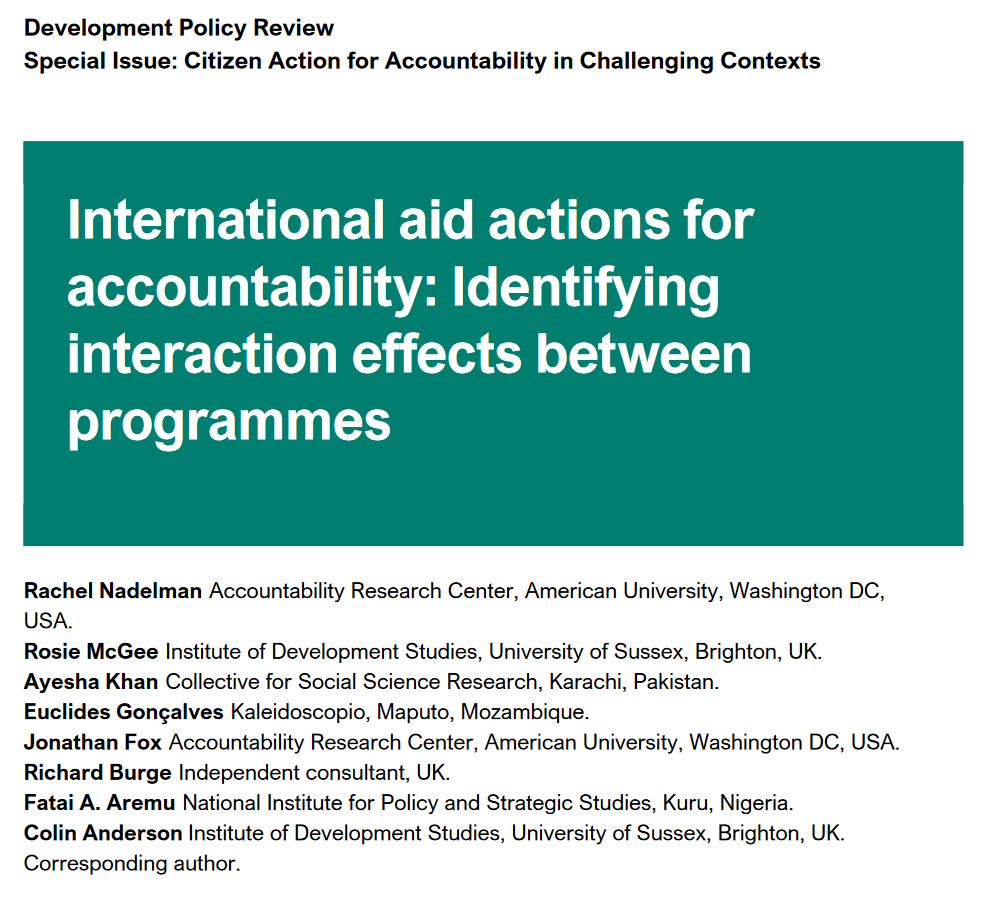
International Aid Actions for Accountability: Identifying Interaction Effects Between Programmes
Date: November 2022
Author(s): Rachel Nadelman, Rosie McGee, Ayesha Khan, Euclides Gonçalves, Jonathan Fox, Richard Burge, Fatai A. Aremu, Colin Anderson
Publication type: Scholarly journal article
Published by: Development Policy Review
Aid agencies that support public accountability reforms commonly do so in the same places, and with similar state and civil society actors. However, the combined effects of their separate programmatic actions are rarely analyzed.
This study departs from conventional analysis of aid agency relationships that focuses on the macro level of donor co-ordination and harmonization. Instead, it looks at the interactions that happen in practice between aid agency programs on the ground. Through doing so it proposes a new conceptual lens for understanding these interactions.
The paper explores how programs with overlapping public accountability goals interact in specific locations and with what effects, based on qualitative fieldwork on four recent programs that overlapped in sub-national areas of Pakistan and Nigeria and supported by lighter-touch research on two programs in Mozambique.
The paper identifies three distinct categories of “interaction effects”—synergy, parallel play, and disconnect. These effects came about both with and without direct engagement between the aid agencies themselves. Synergistic interaction effects—aid agency actions reinforcing one another in pursuit of greater public accountability—were common. Parallel play—siloed working—was also common, risking missed opportunities to extend impact. The study identified one outright disconnect—where aid agency actions undermined each other.
Using this “interaction effects” lens in practice could inform and strengthen aid agency strategies—avoiding conflicting actions and siloed working—and achieving more through synergy with others, particularly in complex contexts. This applies both in program design and in adapting to other aid programs’ actions in real time. Development program research and evaluations would benefit from broadening their lens beyond single-program studies to understand the combined effects of multiple actors.
Rachel Nadelman is Research Fellow at the Accountability Research Center at American University, Washington DC.
Rosie McGee is Senior Fellow at the Institute of Development Studies.
Ayesha Khan is Senior Researcher at the Collective for Social Science Research, based in Karachi.
Euclides Gonçalves is a co-founder and director of Kaleidoscopio, Maputo.
Jonathan Fox is a professor at the School of International Service at American University, where he directs the Accountability Research Center.
Richard Burge is an independent consultant and was formerly a partner at ITAD.
Fatai A. Aremu is the Senior Knowledge and Innovation Manager at the Development Research and Projects Center, Abuja, Nigeria.
Colin Anderson is a research officer at the Institute of Development Studies, working on what drives changes in citizen-state relationships.
